
by Gideon Marcus
SFlying West
Once again, the Journey is brought to you from Japan! Specifically, the nation's capital, Tokyo. We've become old hands at making the trk across the Pacific, especially since Pan Am inaugurated direct 707 service from Los Angeles to Tokyo International.
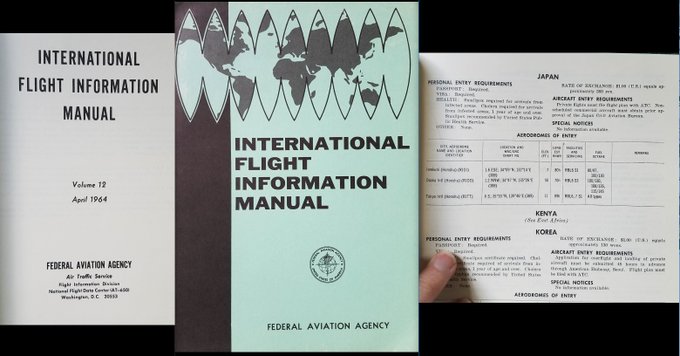

This time, we stayed at a new hotel, in the shadow of the recently completed Tokyo Tower. From the observatory deck of the hotel, the often elusive Mt. Fuji was clearly visible, thanks to a heavy rain that had occurred the night before.


Tokyo remains as it has been for the past 16 years (our first visit was in 1948!) Bustling, filled with energy and cigarette smoke. There is a particular focus on renovation what with the Olympics coming to town soon. Nevertheless, life otherwise goes on normally in the thoroughfares, wide and narrow.



TV cartoons have become a big deal here, with the recently debuted "Mighty Atom" inspiring tons of merchandise.

It's not all roses, though. Up on the other side of the country, an earthquake struck off the coast of Niigata. Then, a tidal wave swept in. The property damage was immense and at least two dozen people have died.
More personally, though my tragedy hardly compares, this month's Fantasy and Science Fiction managed to limbo below the low bar recently set by Editor Avram Davidson (who fled Mexico and apparently now resides in my home state of California).
With a sigh, here we go again:
The Issue at Hand
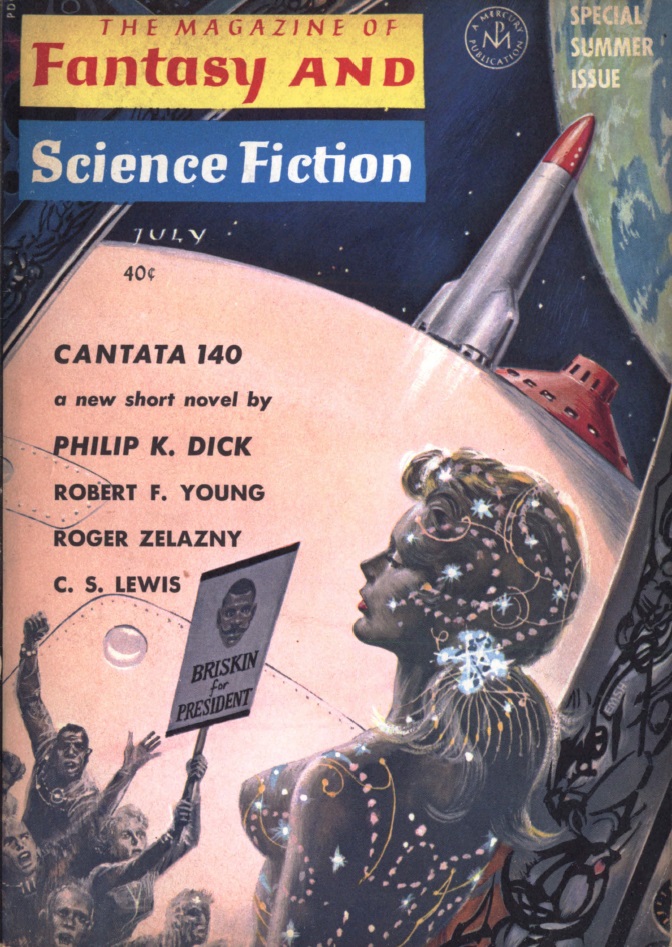
by Ed Emshwiller
Cantata 140, by Philip K. Dick
It is said that too many cooks spoil a broth, and the SFnal corollary is that too many ideas spoil a plot. Indeed, Dick's newest novella, the third in the "News Clown" series set late in the 21st Century, has so many handwaves that I could have used the magazine to fly to Japan. The piece's 60 pages contain:
- An overpopulated world with abortion but not Enovid (birth control medicine).
- A satellite of prostitutes to relieve proceative tension.
- A super cheap way to get to said satellite.
- Precious few other satellites.
- Teleportation.
- Teleportation (accidental) to another world.
- Suspended animation as the standard treatment for excess, unemplopyed population.
- An American population that is more "Colored" than "Caucasian".
- The Presidential campaign of the first "Colored" candidate (the "Event of 1993" caused the demographic shift such that Whites were outnumbered, yet it is not until 2080 that a Black candidate has a chance).
- A two-bodied, one-headed mutant human crime lord.
For the most part, the plot follows Jim Briskin as he tries to become the first "colored" President of the United States. Other things happen, including the "blink-and-you'll-miss-it" incident in which a balky teleporter somehow links Earth to a far-off, virgin planet. It is very quickly taken as read that this is the solution to Earth's frozen overpopulation problem (creating the excuse for the rather esoertic title — it probably refers to Bach's "Sleepers wake!" composition). I suppose if the story stuck to these two threads and developed them in a satisying manner, this could be a good read — especially since it's written by Dick, one of the genre's masters. Instead, the piece is a jumbled mess, stuffed with clumsy jargon, and combining both implausible and contradictory elements with several overly conventional ones.
For example, race relations appear to be stuck in the 1960s even though the story takes place more than a century later. The overpopulation angle makes no sense. At first, I thought there might be moral objections to abortion and/or medical birth control, but given that state-assisted suicide is a sanctioned population stabilizer, I doubt it. And how do the prostitutes not get pregnant? And how do 5000 of them satisfy Earth's billions?
Inconsistencies aside, the narrative is neither interesting nor comprehensible. If I can't have good SF, I'd at least like good satire. If I can't have that, I'll settle for decent writing.
And if that's lacking, there's no rating I can give a story other than…
One star.
The Second Philadelphia Experiment, by Robert F. Young
From the lost pages of Ben Franklin's diary comes an account of the great scientist's further explorations into electricity. It's a facile reproduction of Franklin's style but really just exists to set up a fairly flat joke. I was feeling more charitable when I read it, but now I think it's fair to give it just two stars.
Balloon Astronomy, by Theodore L. Thomas
This month's nonfiction seed for science fiction articles suggests using balloon-mounted instruments to provide constant weather reports. But don't they already do that?
Two stars.
The Scientist and the Monster, by Gahan Wilson
Wilson offers The Twilight Zone episode, "Eye of the Beholder" virtually unchanged except for a slightly improved moral message at the end. Still just worth two stars.
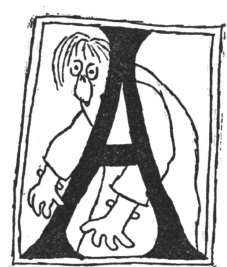
The Happy Place, by Toni Heller Lamb
Ms. Lamb's first published story is a dark piece involving a young girl who finds the cemetery a more hospitable residence than any place of the living. There is a nice final line, and the story is nice in a macabre sort of way, but otherwise it is unremarkable.
Three stars.
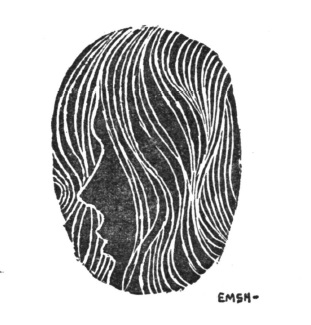
by Ed Emshwiller
The End of the Wine, by C. S. Lewis
This poem, which follows a bedraggled Lemurian as he makes landfall in Stone Age Europe, is made all the more poignant by being the author's last creation (he died last year, same day as JFK). Thus, the double whammy as we realize what we've lost as the man from Atlantis rues over same.
Four stars.
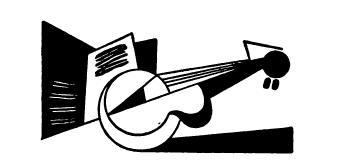
The Salvation of Faust, by Roger Zelazny
An interesting inversion of the Faustian Bargain, it entertains and then disappears. Three stars.
All-Hallows, by Leah Bodine Drake
A tiny poem whose message is that nothing dies — it just becomes part of the world around you.
Three stars.
Nothing Counts, by Isaac Asimov

The Good Doctor regales us with a nonfiction article on the evolution of Roman numerals and the utility of the zero. It's well-written but there is very little useful information, and in particular, almost no history of the zero itself.
Three stars.
The Struldbrugg Reaction, by John Sutherland
New author Sutherland brings us a pointless Sherlock pastiche, the gimmick being that Holmes and Watson ("Bones" and "Dawson") are in their 90s and immortal (thanks to the Struldbrugg Reaction — see Gulliver's Travels to understand the reference).
It's no Lord Darcy. Two stars.
The Girl with the 100 Proof Eyes, by Ron Webb
Some schlubb decants a genie named Jeanie and coerces her to love him. A delightful rape fantasy. One star.
We Serve the Star of Freedom, by Jane Beauclerk
This final story, the first from Ms. Beauclerk, features a clever native of an alien world (inhabited by quite human extraterrestrials) who gets the best of traders from Earth. It's a pleasant story, though more fable than SF. Probably the best prose piece of the issue. Three stars.
Summing Up
Good grief. I do hope Avram Davidson's tenure at the helm of this once proud magazine will soon come to an end. It's either that or my days of subscribing will.
Oh well. At least I'm in Japan!

[Come join us at Portal 55, Galactic Journey's real-time lounge! Talk about your favorite SFF, chat with the Traveler and co., relax, sit a spell…]

![[June 20, 1964] How low can you go? (July 1964 <i>Fantasy and Science Fiction</i>)](https://galacticjourney.org/wp-content/uploads/2019/06/640620cover-672x372.jpg)

![[May 18, 1964] Aspirations (June 1964 <i>Fantasy and Science Fiction</i>)](https://galacticjourney.org/wp-content/uploads/2019/05/640518cover-672x372.jpg)


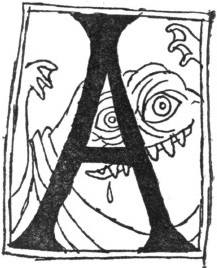 tiny piece in which we learn:
tiny piece in which we learn:
![[March 17, 1964] It's all Downhill(April 1964 <i>Fantasy and Science Fiction</i>)](https://galacticjourney.org/wp-content/uploads/2019/03/640317cover-667x372.jpg)






